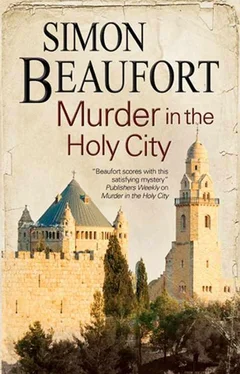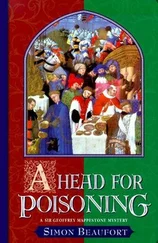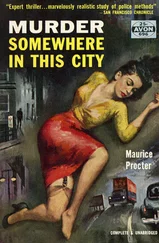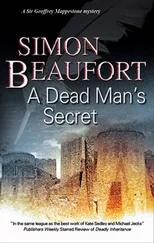Simon Beaufort - Murder in the Holy City
Здесь есть возможность читать онлайн «Simon Beaufort - Murder in the Holy City» весь текст электронной книги совершенно бесплатно (целиком полную версию без сокращений). В некоторых случаях можно слушать аудио, скачать через торрент в формате fb2 и присутствует краткое содержание. Год выпуска: 0101, Жанр: Исторический детектив, на английском языке. Описание произведения, (предисловие) а так же отзывы посетителей доступны на портале библиотеки ЛибКат.
- Название:Murder in the Holy City
- Автор:
- Жанр:
- Год:0101
- ISBN:нет данных
- Рейтинг книги:3 / 5. Голосов: 1
-
Избранное:Добавить в избранное
- Отзывы:
-
Ваша оценка:
- 60
- 1
- 2
- 3
- 4
- 5
Murder in the Holy City: краткое содержание, описание и аннотация
Предлагаем к чтению аннотацию, описание, краткое содержание или предисловие (зависит от того, что написал сам автор книги «Murder in the Holy City»). Если вы не нашли необходимую информацию о книге — напишите в комментариях, мы постараемся отыскать её.
Murder in the Holy City — читать онлайн бесплатно полную книгу (весь текст) целиком
Ниже представлен текст книги, разбитый по страницам. Система сохранения места последней прочитанной страницы, позволяет с удобством читать онлайн бесплатно книгу «Murder in the Holy City», без необходимости каждый раз заново искать на чём Вы остановились. Поставьте закладку, и сможете в любой момент перейти на страницу, на которой закончили чтение.
Интервал:
Закладка:
“Thank God!” said Hugh, rising to thump him on the shoulder in a comradely way. “We have been worried sick about you. Where have you been?”
Geoffrey told him, briefly, as he began to remove his armour. Hugh gave a whistle.
“Hell’s fires! Daimbert plays a dangerous game.”
Geoffrey tugged off a boot, releasing a thin stream of water onto the floor, and then removed the other. “So do we all.”
Hugh looked at him strangely. “What do you mean?”
Geoffrey was inutterably weary and longed only to rest. But he could not, in all countenance, sleep while Hugh remained in danger from Roger. He did not want to embark on a long explanation there and then outlining his reasons for Roger’s guilt, and he settled for an explanation that would satisfy Hugh, but that would put him on his guard too.
“I think I know the identity of the killer,” he said. “And it is not one of the Advocate’s men. Be careful, Hugh. I will not be long in exposing the murderer.”
Hugh looked as if he would ask questions, but Geoffrey pushed him firmly from his room and closed the door. He rummaged around for a dry hose and lay on the bed. After a moment, he rose and dragged the heavy chest across the floor to block the door. Then he unsheathed his dagger and lay it on the bed near his hand, and was asleep the moment his head touched the covers.
Later, the handle of the door began to turn slowly; the door eased open with the same deadly care. And then it stopped. The killer pushed a little more, but the door would not budge. He pushed harder still, and the chest gave a protesting crack. Through the partially opened door, the killer saw Geoffrey stir in his sleep, and noted the dagger near his hand. He grimaced. Time was running out: he had already failed to kill Geoffrey with the arrow fired at him at Abdul’s Pleasure Palace the previous night; Geoffrey had survived the attack by Greeks in the old Saracen Quarter; and now he would live because the killer could not enter his room without the heavy chest giving him away. But there would be other opportunities.
Meanwhile, the dog watched curiously, then went back to its dozing.
The angle of the sun slanting in through the window told Geoffrey it was late afternoon and that he had slept most of the day. He heaved himself stiffly off the bed and went to the garderobe, where he splashed water from a jug over his head and body, and shaved quickly. The dog came to slather expectantly, nudging Geoffrey toward the box in which unpleasant tendrils of dried meat were stored for occasions such as this. As he had done hundreds of times before, Geoffrey yet again earned the dog’s eternal devotion-an eternity that would last until it finished whatever morsel it sat chewing noisily. Geoffrey excavated a fresh shirt from an untidy pile on a shelf, poured himself a goblet of wine, ignored the dog’s whines for more food, and sat down to think.
He went over the facts he knew for certain. The knight, Guido, and the monks, Jocelyn and Pius, had been killed within four days of each other. Guido had been bereaved and had taken to walking alone near the Dome of the Rock; he was also having doubts about the morality of his knightly duties and was considering a monastic vocation. Meanwhile John of Sourdeval was a serious young man, who perhaps spent too much time philosophising. So each in his own way was vulnerable. Guido, it seemed, had discovered something that prompted him to contact the Advocate’s scribe Jocelyn. Jocelyn had probably written whatever it was down for him because Guido was illiterate and the monk had then been in a state of nervous agitation from the time Guido’s body was discovered until his own death two days later. After his death, Guido had been sent a letter from the Advocate that had been addressed to Brother Salvatori, which meant that, in all probability, what he had dictated to Jocelyn had been a letter to the Advocate, and the Advocate had acknowledged his letter by responding to the name Guido planned to choose when he took his monkish vows.
Pius, the third victim, had been murdered in the house of Maria Akira’s father, but had no known connections with the Patriarch or anyone else in power. Could his death have been a mistake then? Or a random killing to take attention from the fact that there had been a very good reason for the deaths of Guido and Jocelyn? The more Geoffrey thought about it, the more that seemed to be plausible. He had been told from the beginning how random the murders seemed to be: the three priests were not the same nationality, not from the same Order, and seemed to have no connection with each other.
Except the daggers. Geoffrey had seen the carved dagger that had killed John, and he had been told that similar weapons had been used to kill the other victims. Some witnesses had considered the weapon beautiful, others gaudy, depending on their taste. But all five weapons had disappeared, either at the scene, or later, so that Geoffrey could not compare them with the one that had been used to pin the pig’s heart to his wall.
And the last victim, poor Loukas, had been conveniently dispatched while Melisende languished in the dungeons of her uncle. It was perfectly clear that Loukas’s death had been arranged, as Hugh had said from the beginning, to prove Melisende’s innocence. Loukas was killed in the Holy Sepulchre, and was a poor madman whom nobody would mourn-the most readily dispensable of the monks at the Church and the one selected as a sacrifice for Melisende. The body was found by Celeste. And Geoffrey now knew that Celeste worked for the Patriarch and was deeply involved in his black-market business. Celeste would probably also know-from the Patriarch himself-about the kind of dagger used by the murderer. But Geoffrey only had Celeste’s word that such a dagger had been found on Loukas: the body had been covered with a blanket before the other monks had come, and Celeste claimed the dagger had later disappeared.
So, there was the killer of Loukas, thought Geoffrey. Nasty Brother Celeste, working possibly under the Patriarch’s instructions so that Melisende could be freed to continue her work in the Greek Quarter. It also explained why Loukas was so different from the others-he had merely been available when Celeste had needed a victim in a hurry. So did Celeste kill the others too? Geoffrey thought back to the bodies in the Holy Sepulchre. He had made a rough measurement of the wounds in John and Loukas, but they had not been the same. The wound in Loukas had been bigger, which Geoffrey had attributed to tearing. But it was equally possible, even likely, that it had not been caused by the same kind of weapon.
He considered his list of suspects. At the top was Celeste, whom Geoffrey was now certain had killed Loukas. Yet, it seemed Celeste did not actually have a dagger that would tie Loukas’s death to the others, and he had simply pretended that Loukas had been killed with one. So, it was possible that Celeste was not the murderer of the others. Geoffrey compared the lame monk to the victims: illiterate Pius, who did the shopping for his brethren, including braving Akira’s slaughterhouse; and the two knights, trained in combat from youth. The Crusade had not been an easy journey, and those knights who had survived it owed their lives to their superior fighting skills and finely tuned instincts. Stabbing men in the back required no great strength, as Geoffrey himself had pointed out to Hugh when they discussed Melisende’s possible guilt, but it might well require speed. Having followed Celeste down the tunnels under the city, Geoffrey knew he was not a speedy mover.
The next suspect was Melisende, the aggressive, single-minded niece of the Patriarch. If Celeste had killed Loukas, then had Melisende killed the others? Perhaps Celeste genuinely believed Melisende’s guilt when he had murdered Loukas to free her. Geoffrey rubbed his sore eyes. But was that really necessary? Why could the Patriarch not simply release her? But the answer to that was clear in the light of Melisende’s revelations in the palace that morning: the Greek community would have been rightly suspicious of an unexplained release, and she would not have been able to carry on passing their secrets to Uncle to the same extent. Loukas’s murder was a sufficiently spectacular and public statement of her innocence to allow her release without question.
Читать дальшеИнтервал:
Закладка:
Похожие книги на «Murder in the Holy City»
Представляем Вашему вниманию похожие книги на «Murder in the Holy City» списком для выбора. Мы отобрали схожую по названию и смыслу литературу в надежде предоставить читателям больше вариантов отыскать новые, интересные, ещё непрочитанные произведения.
Обсуждение, отзывы о книге «Murder in the Holy City» и просто собственные мнения читателей. Оставьте ваши комментарии, напишите, что Вы думаете о произведении, его смысле или главных героях. Укажите что конкретно понравилось, а что нет, и почему Вы так считаете.












